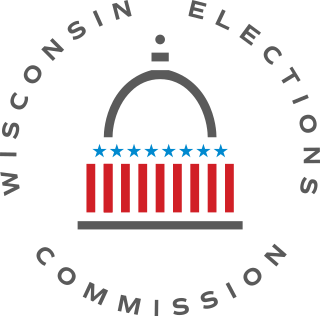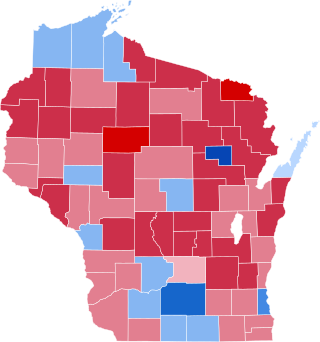Related Research Articles
Voter caging involves challenging the registration status of voters and calling into question the legality of allowing them to vote. Usually it involves sending mail directly to registered voters and compiling a list from mail returned undelivered. Undeliverable mail is seen as proof that the person no longer resides at the address on their voter registration. The resultant list is then used by election officials to purge names from the voter registration rolls or to challenge voters' eligibility to vote on the grounds that the voters no longer reside at their registered addresses.

The Wisconsin Supreme Court is the highest appellate court in Wisconsin. The Supreme Court has jurisdiction over original actions, appeals from lower courts, and regulation or administration of the practice of law in Wisconsin.

Steve CarMichael Jones is a United States district judge for the United States District Court for the Northern District of Georgia and a former Georgia Superior Court judge.
Shelby County v. Holder, 570 U.S. 529 (2013), was a landmark decision of the Supreme Court of the United States regarding the constitutionality of two provisions of the Voting Rights Act of 1965: Section 5, which requires certain states and local governments to obtain federal preclearance before implementing any changes to their voting laws or practices; and Section 4(b), which contains the coverage formula that determines which jurisdictions are subject to preclearance based on their histories of discrimination in voting.
David W. Opitz is a former member of the Wisconsin State Assembly and the Wisconsin State Senate.

Voter suppression in the United States consists of various legal and illegal efforts to prevent eligible citizens from exercising their right to vote. Such voter suppression efforts vary by state, local government, precinct, and election. Voter suppression has historically been used for racial, economic, gender, age and disability discrimination. Before and during the American Civil War, most African-Americans had not been able to vote. After the Civil War, all African-American men were granted voting rights, causing some Southern Democrats and former Confederate states to institute actions such as poll taxes or language tests that were ostensibly not in contradiction to the U.S. Constitution at the time, but were used to limit and suppress voting access, most notably African American communities that made up large proportions of the population in those areas, but in many regions the majority of the electorate as a whole was functionally or officially unable to register to vote or unable to cast a ballot. African Americans' access to registration and voting in the South was often difficult until the Civil Rights Act of 1964, and continues to be a subject of debate.

Brad Schimel is an American prosecutor and judge. He was the 44th Attorney General of Wisconsin, serving from 2015 to 2019. He was defeated seeking re-election in 2018, and was subsequently appointed Wisconsin Circuit Court Judge in Waukesha County, Wisconsin, by Governor Scott Walker. Prior to winning election as Attorney General, Schimel was district attorney of Waukesha County.
Brian Keith Hagedorn is an American lawyer and a justice of the Wisconsin Supreme Court, serving since 2019. Prior to his election to the Supreme Court, he served four years as a judge on the Wisconsin Court of Appeals in the Waukesha-based District II.

The Wisconsin Elections Commission is a bipartisan regulatory agency of the State of Wisconsin established to administer and enforce election laws in the state. The Wisconsin Elections Commission was established by a 2015 act of the Wisconsin Legislature which also established the Wisconsin Ethics Commission to administer campaign finance, ethics, and lobbying laws. The two commissions began operation on June 30, 2016, replacing the Wisconsin Government Accountability Board (GAB), which was abolished.
The Wisconsin Institute for Law and Liberty (WILL) is a nonprofit conservative law firm based in Milwaukee, Wisconsin. The group was founded by lawyer Rick Esenberg in 2011.
Husted v. A. Philip Randolph Institute, No. 16-980, 584 U.S. ___ (2018), was a case before the Supreme Court of the United States regarding Ohio's voter registration laws. At issue was whether federal law, 52 U.S.C. § 20507, permits Ohio's list-maintenance process, which uses a registered voter's voter inactivity as a reason to send a confirmation notice to that voter under the National Voter Registration Act of 1993 and the Help America Vote Act of 2002. If the mail is not returned, the voter is stricken from the rolls, a practice called voter caging. The Court ruled in a 5–4 decision that Ohio's law did not violate federal laws.

Fish v. Kobach was a 2018 bench trial in the United States District Court for the District of Kansas in which five Kansas residents and the League of Women Voters contested the legality of the Documentary Proof of Citizenship (DPOC) requirement of the Kansas Secure and Fair Elections (SAFE) Act, which was enacted in 2011 and took effect in 2013.
The Public Interest Legal Foundation (PILF) is an American conservative legal group based in Alexandria, Virginia, which is known for suing states and local governments to purge voters from election rolls. The nonprofit was constituted in 2012.

The 2020 United States presidential election in Wisconsin was held on Tuesday, November 3, 2020, as part of the 2020 United States presidential election in which all 50 states plus the District of Columbia participated. Wisconsin voters chose electors to represent them in the Electoral College via a popular vote, pitting the Republican Party's nominee, incumbent President Donald Trump, and running mate Vice President Mike Pence against Democratic Party nominee, former Vice President Joe Biden, and his running mate California Senator Kamala Harris. Wisconsin has 10 electoral votes in the Electoral College.
Jennifer Elise Nashold is an American attorney, currently serving as a judge of the Wisconsin Court of Appeals. She was elected in 2019.

The 2020 Wisconsin Fall General Election was held in the U.S. state of Wisconsin on November 3, 2020. All of Wisconsin's eight seats in the United States House of Representatives were up for election, as well as sixteen seats in the Wisconsin State Senate and all 99 seats in the Wisconsin State Assembly. Voters also chose ten electors to represent them in the Electoral College, which then participated in selecting the president of the United States. The 2020 Fall Partisan Primary was held on August 11, 2020.

The 2019 Wisconsin Spring Election was held in the U.S. state of Wisconsin on April 2, 2019. There was one seat on the Wisconsin Supreme Court on the ballot, as well as several other nonpartisan local and judicial elections. There were also a number of local referendums for school funding. The 2019 Wisconsin Spring Primary was held February 19, 2019.
In direct response to election changes related to the COVID-19 pandemic and 2020 United States presidential election in Wisconsin; the Donald Trump 2020 presidential campaign launched numerous lawsuits contesting the election processes of Wisconsin. All of these were either dismissed or dropped.

The 2015 Wisconsin Spring Election was held in the U.S. state of Wisconsin on April 7, 2015. There was a contested election for justice of the Wisconsin Supreme Court, as well as several other nonpartisan local and judicial elections and an amendment to the Constitution of Wisconsin to change the process for selection of the chief justice of the State Supreme Court. In addition, the ballot contained a special election to fill a vacancy in the 20th State Senate district. The 2015 Wisconsin Spring Primary was held February 17, 2015.

The 2023 Wisconsin Spring Election was held in the U.S. state of Wisconsin on April 4, 2023. The featured race at the top of the ticket was for an open seat on the Wisconsin Supreme Court, which became the most expensive judicial election in history. Several other nonpartisan local and judicial offices were also be on the April 4 ballot, including mayoral elections in some of Wisconsin's larger cities—Green Bay, Madison, and Racine. In addition, a special election was held in the 8th State Senate district, concurrent with the Spring elections. The 2023 Wisconsin Spring Primary was held February 21, 2023.
References
- ↑ Wisconsin Courts - Judges, State of Wisconsin . Retrieved December 24, 2019.
- ↑ "Hon. Paul V. Malloy Judge Profile on Martindale.com".
- ↑ Spring election 2015 , Wisconsin Elections Commission . Retrieved December 24, 2019.
- ↑ Courthouse spat: Judge prompts investigations, USA Today , Eric Litke, February 27, 2018. Retrieved December 24, 2019.
- ↑ Wisconsin judge orders removal of 234,000 voters from state registry, FOX6Now , Amy Dupont, December 13, 2019. Retrieved December 24, 2019.
- ↑ Effort to stop removal of 234K voter registrations heads to federal court, while attorney general tries to stall purge in state court, Milwaukee Journal Sentinel, Bruce Vielmetti and Molly Beck, December 17, 2019. Retrieved January 4, 2020.
- ↑ Archived Project, Pew Charitable Trust . Retrieved December 26, 2019.
- ↑ Another Use for A.I.: Finding Millions of Unregistered Voters, New York Times, Steve Lohr, November 5, 2018. Retrieved December 26, 2019.
- 1 2 Nearly 900 Lincoln County voters affected, Tomahawk Leader, Jalen Maki, December 27, 2019. Retrieved August 22, 2020.
- ↑ Vetterkind, Riley (2 January 2020). "Conservative legal group alleges Elections Commission in contempt of court". Wisconsin State Journal . Retrieved 2020-01-03.
- ↑ Wisconsin Elections Officials Held in Contempt for Refusing to Purge Voters, New York Times , January 13, 2020. Retrieved August 23, 2020.
- 1 2 Wisconsin Elections Officials Held in Contempt for Refusing to Purge Voters, New York Times , Mitch Smith, January 13, 2020. Retrieved August 20, 2020.
- ↑ State Court of Appeals reverses Wisconsin voter purge, The Daily Cardinal , Amani Omari, March 2, 2020. Retrieved August 20, 2020.
- ↑ Upset Victory in Wisconsin Supreme Court Race Gives Democrats a Lift, New York Times , April 13, 2020. Retrieved August 20, 2020.
- ↑ WisEye Morning Minute: Supreme Court Hears Voter Roll Purge Case, WPR , September 29, 2020. Retrieved November 20, 2020.
- ↑ Bauer, Scott (2021-04-09). "Wisconsin Supreme Court says don't purge voters from rolls". PBS NewsHour. Associated Press. Retrieved 28 June 2021.